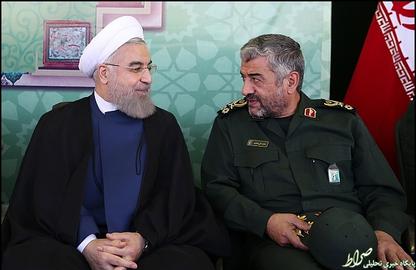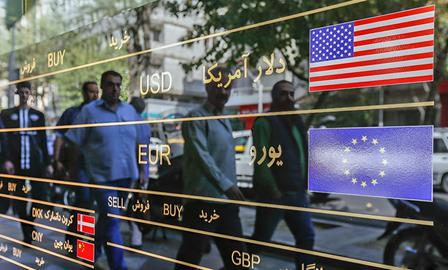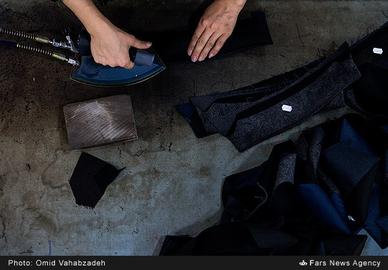-
Iran’s hardliners have lashed out at Rouhani for signing up to an anti-terrorism and anti-money laundering agreement they say threatens Iranian sovereignty.
-
Rouhani's administration says the deal will help deliver the benefits promised as part of the nuclear deal.
-
Iran’s compliance with the pact demonstrates its commitment to fighting terrorism and corruption on the international stage, but will it compromise Iran’s power in the region?
-
Businesses linked to the Revolutionary Guards remain under sanctions restrictions.
-
International banks are wary of working with Iran out of fear of being unknowingly linked to terrorist offenses, though the deal could build confidence in forging deals.
-
Although Rouhani’s administration keeps a safe distance from the Guards, it still partners with the corps when it comes to driving its agenda in the wider region.
Nowadays, Iran’s hardliners cannot stop talking about the Financial Action Task Force on Money Laundering, or FATF. The disdain they once reserved for the nuclear agreement is now firmly focused on FATF, which many of them describe as a much worse deal than last year’s controversial agreement.
Hardliners accuse President Rouhani’s government of treason, and warn that if FAFT is implemented, Iran will be forced to relinquish its sovereign rights — a refrain heard throughout the long series of nuclear talks throughout 2014 and 2015. They argue that FATF contravenes Sharia law, and have appealed to Iran’s High Civil Court, parliament, the Supreme National Security Council and Iran’s Prosecutor-General to stop the agreement in its tracks.
So what is all the commotion about?
FATF, or the Financial Action Task Force on Money Laundering, is also known by its French acronym GAFI (Financial Action Workgroup). It was set up in 1989 to fight money laundering and, after the September 11 terror attacks in the United States, to identify and block funding for terrorist groups. Currently, the international task force works with 192 countries, directly or indirectly.
In 2007, Iran, North Korea and Cuba were put on the task force’s blacklist, and faced widespread restrictions in banking transactions as a result. Iran was accused of money laundering and of funding terrorist groups. Today, North Korea and Iran remain on the list, while Cuba has been removed.
During the first term of the presidency of Mahmoud Ahmadinejad (2005-2009), the government pursued various avenues to remove Iran from the blacklist. In winter 2008, a number of Iranian Central Bank officials met a US Treasury representative in Paris with a view to resolving the issues via private conversations and without public knowledge. However, news of the secret negotiations was leaked, and the talks ended in controversy rather than resolution.
The same year, the Ahmadinejad administration passed a law to fight money laundering and set up the Supreme Council to Fight Money Laundering. In 2009, they drew up protocols for the law. But Iran remained on the blacklist because the two sides could not agree on the definitions for money laundering and terrorism. In the end, Ahmadinejad’s government gave up, accusing FATF of being “discriminatory” and “political”.
A Breathing Space
Under President Rouhani, the government has renewed efforts to get Iran off the list, engaging in intense lobbying abroad. In the winter of 2015, it successfully urged parliament to pass the Law to Fight Terrorism Funding — a piece of legislation that had been stalled in parliament since 2011. The government also hoped that, in the aftermath of the nuclear agreement, western powers would be more willing to cooperate with Iran, and would regard the new law as a sign of Iran’s commitment to combating money laundering. But its hopes were dashed, and Iran remained on the FATF blacklist.
But the task force did extend Iran a boon, suspending restrictions on Iran for one year in order to give its leaders the opportunity to make significant progress. “The FATF welcomes Iran's adoption of, and high-level political commitment to, an Action Plan to address its strategic (anti-money laundering and anti-terror financing) deficiencies,” a FATF public statement said. “The FATF therefore has suspended counter-measures for 12 months in order to monitor Iran's progress in implementing the Action Plan.”
Iran signed the plan in June, and both sides hope for any remaining issues to be resolved. But the text of the agreement has been kept confidential — and this is what has led to controversy among some of Iran’s conservative politicians and media.
Iran’s Law to Fight Terrorism Funding does not list liberation movements fighting against foreign occupations as terrorists. For example, Iran does not consider Lebanese Hezbollah a terrorist group — while western countries and FATF do. This issue could be resolved if parliament agrees to amend the law, but the government alone cannot push it through. Rouhani’s opponents say that passing such an amendment simply to mollify the task force would amount to debilitating resistance groups, groups that Iran relies on to project its power in the region.
Enter the Revolutionary Guards
But there is another issue. Some individuals and legal entities continue to face sanctions as part of the nuclear agreement: they are listed in an appendix to the nuclear agreement, or the Joint Comprehensive Plan of Action as it is known.
Most are affiliated with the Revolutionary Guards and face trading restrictions because of human rights violations and links to recognized terrorist organizations. If Iranian banks deal with these entities, they are automatically considered to be guilty of money laundering or funding terrorism.
Iran’s economic recovery relies in part on this issue being solved. Without the resumption of banking transactions, the financial benefits the nuclear agreement were expected to produce are doomed. Rouhani’s government is well aware that this could destroy his chances in the forthcoming 2017 presidential election, and jeopardize his plans for a second term. Major foreign banks refuse to deal with Iran out of fear of being accused of money laundering and funding terrorism. They know that sanctions in these specific areas remain in place and that the US government is willing and able to identify them and impose huge fines. Iran must solve the problem from within inside the country.
Domestically, it may be that the Revolutionary Guards have no problem. On September 5, Valiollah Seif, the president of Iran’s Central Bank, wrote to Iranian banks, instructing them not to impose restrictions based on western sanctions when going about business inside Iran. However, if banks work with those entities linked to the Revolutionary Guards that remain on the sanctions list, foreign banks will refuse to deal with them. So in practice, Iranian banks cannot heed the orders of the Central Bank and ignore the sanctions.
Of course, if Iran wants to support Lebanese Hezbollah or Houthis in Yemen, it will not go through the international banking network anyway. So Iran’s new law will have little effect on the country’s support for groups in Iraq, Syria, Yemen and Lebanon. Also, Revolutionary Corps officials might boast to the media about their support for Hezbollah and others — but they know full well that they cannot be so bold on banking and financial documents. And, when it comes down to it, the Iranian government works in partnership with the Revolutionary Guards and affiliated groups including the expeditionary Quds Force to help paramilitary groups in the region.
Losing the Competitive Edge
If the reality is that the government actually works with the Guards to promote Iran’s agenda in the region, why do hardliners have such a problem with FATF?
Firstly, they equate agreeing with FATF with an admission of guilt, and they are not about to accept the charges of money laundering and funding terrorism. They do not want to accept the terrorist label given to the groups they support in the region — a move that would have long-range consequences. And there’s a clear economic incentive too: If the Iranian government reaches an agreement with FATF, the Revolutionary Guards will have to have to figure out a way of bypassing sanctions — and pay for it, without any support from the government or Iran’s banks.
Rouhani’s government is well aware that the Revolutionary Guards Corps is not about to change its modus operandi as far as human rights or the support for regional paramilitary groups are concerned, but it wants to keep a safe distance, at least as far as appearances go. As with its stance on missile tests, the government’s message to the Guards is: “Do it, but do not publicize it.” Now the government is effectively saying the Guards can have its own financial network and support paramilitary groups, but it should steer clear of the Iranian banking system because it wants to reintegrate it with international banking systems.
But accepting this arrangement is potentially damaging for businesses linked to the Revolutionary Guards, undermining their competitive value and marking them as unreliable and suspect. Without currency transactions made through the domestic banking system, these entities cannot make deals without hiding behind another company — and that would mean fewer profits and more hassle.
Brother Smugglers
But even if the Rouhani administration does not reach an agreement with the west over terrorism, it knows that Iran’s banks are involved in a large number of money laundering deals, from smuggling to drug trafficking. Even when the Revolutionary Guards do not have direct involvement, “Brother Smugglers” with links to the Guards are usually in some way connected. Many of these people have swapped being a commander for being a businessman, and they are unwilling to give up their resources and profits without a fight. In fact, some of them would willingly sabotage Rouhani’s deals with the international community to maintain their power — and they would even do it in the name of the regime or the Revolutionary Guards if required.
So how will Iran’s economic and political landscape fare in such an environment? Rouhani’s government, and even some principalists — those who see themselves as carrying through the original ideals of the Islamic Revolution — want to shake up the Revolutionary Guards’ influence in Iran’s economy. For them, they can only see further damage in the continued militarization of the economy, and the damage that has already been done is substantial. Whether or not those who believe this will have enough power to really shift the country’s financial inner workings is another matter. The current quarrel over FATF is a reflection of this more fundamental fight over the Iranian economy. If the government can amend the relevant laws, restrict the Guards’ access to the domestic banking system and minimize the costs of its participation in international transactions, then it would be one step closer to this desired demilitarization. But this would mean smothering the Revolutionary Guards and, of course, the knock-on effect would be that the Guards would punish everybody else.
The Revolutionary Guards and Rouhani’s opponents cite other reasons for objecting to FATF. They argue that the government is willing to provide FATF — which it sees as a western-dominated organization — with key financial information that would undermine Iran’s national security. For them, forging an agreement with FATF means less involvement in helping the resistance movements crucial to building Iran’s role in the region. Cutting the Revolutionary Guards off from the domestic banking system would only serve to embolden the West to apply more pressure on them and bolster these countries’ efforts to achieve what they want in the region. Once again, hardliners hold up the nuclear deal as ample evidence of a government tied by an agreement that has not provided for Iran. The government must rescind its agreement with FATF with immediate effect, they say.
But spokespeople for Rouhani’s government have stood firm on the subject. “We ourselves” will decide who is a terrorist and who is not, they say. Iran’s minister of the economy has cited the anti-ISIS cooperation between Iran and Russia as a positive example of international collaboration to fight money laundering. And the president of the Iranian Central Bank has denied there will be no exchange of sensitive information — claiming that it is up to Iran to choose what information it provides.
Opponents of the FATF deal have applied a good deal of pressure over the last month, successfully bringing their complaints before the Supreme Council for National Security. Members of parliament with close links to the Revolutionary Guards have repeatedly issued warnings to President Rouhani and summoned his cabinet ministers for questioning.
While the Supreme Council for National Security considers the matter, the battle continues. Those who oppose the deal have reason to be hopeful, especially if they gain enough power to stall the implementation of the FATF agreement as they did last year on another set of contracts. When, on September 30, 2015, the Iranian government approved general terms for new oil and gas contracts — known as the Iran Petroleum Contract (IPC) — with a view to attracting foreign investment, a similar outburst ensued. In that case, the proposed bill got held up somewhere in Ayatollah Khamenei’s office and the hallways of parliament.
Hardliners do not plan to stop there. The FATF agreement is only one of several post-nuclear agreement deals that Rouhani’s opponents want to neutralize. Since the future of Iran’s economy and politics are both at stake, both sides will do what they can to ensure their particular vision of this future wins out.
visit the accountability section
In this section of Iran Wire, you can contact the officials and launch your campaign for various problems





















comments